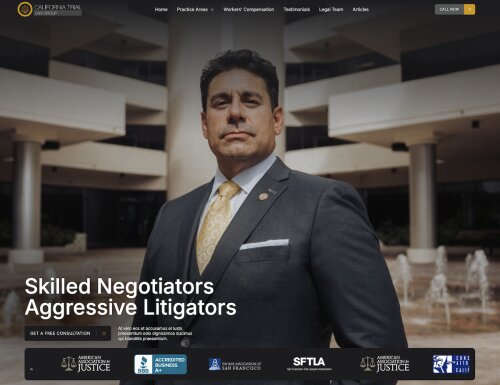Best ADR Mediation & Arbitration Lawyers in Georgia
Share your needs with us, get contacted by law firms.
Free. Takes 2 min.
Or refine your search by selecting a city:
List of the best lawyers in Georgia, United States
About ADR Mediation & Arbitration Law in Georgia, United States
Alternative Dispute Resolution, or ADR, is an umbrella term for processes such as mediation and arbitration that help people resolve legal disputes outside of traditional court proceedings. In Georgia, ADR has become a crucial element in both civil and certain family law matters. Courts encourage or may even require parties to attempt mediation or arbitration to relieve backlogged dockets, save time, and reduce litigation costs. Mediation provides a setting where parties, guided by a neutral mediator, can discuss issues and seek mutually acceptable solutions. Arbitration involves a neutral arbitrator who hears evidence in a less formal setting than a court and then makes a decision that may be binding or non-binding depending on the agreement between the parties. Both processes are widely used in Georgia's legal system for matters such as contracts, employment, personal injury, business, and family law disputes.
Why You May Need a Lawyer
While ADR processes are designed to be more accessible and less formal than traditional court lawsuits, having a knowledgeable attorney can be highly beneficial. Common situations where legal help is useful include:
- Understanding your rights and obligations before participating in mediation or arbitration
- Preparing documents, evidence, and negotiating strategies
- Evaluating proposed settlements to make sure your interests are protected
- Reviewing or drafting arbitration agreements or mediation clauses in contracts
- Ensuring compliance with Georgia's specific ADR procedures
- Explaining the differences between binding and non-binding arbitration
- Ensuring that any agreement reached during mediation or awarded in arbitration is legally enforceable
- Challenging or enforcing arbitration awards in the Georgia courts
A lawyer with ADR experience can offer effective guidance and advocacy to protect your rights and promote a fair outcome.
Local Laws Overview
Georgia has specific statutes and court rules governing mediation and arbitration. The Georgia Uniform Arbitration Act and the Georgia Supreme Court Alternative Dispute Resolution Rules outline procedures and standards for both voluntary and court-ordered ADR processes. Some key aspects of local law include:
- Mandatory court-ordered mediation in certain civil and family law cases
- Confidentiality of communications in mediation, subject to some exceptions such as threats of harm or fraud
- Enforceability of written settlement agreements reached in mediation or arbitration
- Arbitrators must be impartial and are often selected by agreement, or by a designated ADR organization
- Time limits to challenge or confirm arbitration awards in court
- Recognition of both binding and non-binding arbitration, depending on agreement terms
- Specialized ADR programs in several Georgia counties and courts
Understanding these laws and rules ensures that your interests are represented and that you comply with necessary procedures.
Frequently Asked Questions
What is the difference between mediation and arbitration?
Mediation is a facilitated negotiation with a neutral mediator who helps parties reach a voluntary agreement. Arbitration is more like a private trial, where an arbitrator hears both sides and makes a decision, which can be binding or not depending on your agreement.
Is ADR required in Georgia?
In many civil and family court cases, mediation is required before going to trial. Arbitration is generally optional but can be mandated by prior contract or agreement.
How do I start the mediation or arbitration process in Georgia?
You can agree with the other party to mediate or arbitrate, or be ordered by a court to do so. Contact a certified mediator, an ADR program, or an attorney to begin the process.
Can I have a lawyer represent me in mediation or arbitration?
Yes. You are allowed to have legal counsel represent and advise you during mediation or arbitration, which can help protect your interests.
Are mediation discussions confidential?
Generally, yes. Georgia law protects mediation communications from being disclosed in court, with exceptions for threats, fraud, or criminal activity.
Is an arbitrator's decision binding?
It depends on your agreement. Many arbitrations are binding, meaning the decision is final and enforceable in court. Non-binding arbitration means the award is advisory and does not preclude a court trial.
What happens if we reach an agreement in mediation?
If you settle, the agreement is put in writing and becomes legally binding. For court cases, this agreement can be submitted and enforced by the court.
Can I appeal an arbitration award in Georgia?
Appeals after binding arbitration are very limited. Courts can only overturn awards for specific reasons like fraud, corruption, or arbitrator misconduct.
What types of disputes can be resolved with ADR in Georgia?
Most civil disputes, including contract, real estate, business, personal injury, and many family law matters, can use ADR. Some criminal cases and certain statutory matters cannot.
How do I enforce a mediated settlement or arbitration award?
Written settlement agreements and arbitration awards can usually be enforced in Georgia courts through legal filings. A lawyer can assist you with the process if the other party fails to comply.
Additional Resources
Several organizations and agencies offer information, referrals, and ADR services in Georgia:
- Georgia Office of Dispute Resolution - oversees court-connected ADR and maintains a list of registered neutrals
- State Bar of Georgia - provides lawyer referrals and educational materials on ADR
- Local county courthouse ADR programs - many counties have dedicated offices for mediation and arbitration matters
- American Arbitration Association (AAA) - offers private and commercial arbitration resources and services
- Georgia Commission on Dispute Resolution - governs ADR standards and certifications statewide
Contact these organizations or visit their local offices for guidance tailored to your situation.
Next Steps
If you believe you need legal help with mediation or arbitration in Georgia, start by gathering all relevant documents and details about your dispute. Consult an experienced Georgia ADR attorney who can explain your options, advise you on the best course of action, and represent you during the process. You can connect with a lawyer through the State Bar of Georgia or local legal aid organizations if you require assistance. If your dispute is already in court, ask about local court ADR programs. Taking early and informed action can help you resolve your dispute faster, more affordably, and with less stress.
Lawzana helps you find the best lawyers and law firms in Georgia through a curated and pre-screened list of qualified legal professionals. Our platform offers rankings and detailed profiles of attorneys and law firms, allowing you to compare based on practice areas, including ADR Mediation & Arbitration , experience, and client feedback.
Each profile includes a description of the firm's areas of practice, client reviews, team members and partners, year of establishment, spoken languages, office locations, contact information, social media presence, and any published articles or resources. Most firms on our platform speak English and are experienced in both local and international legal matters.
Get a quote from top-rated law firms in Georgia, United States — quickly, securely, and without unnecessary hassle.
Disclaimer:
The information provided on this page is for general informational purposes only and does not constitute legal advice. While we strive to ensure the accuracy and relevance of the content, legal information may change over time, and interpretations of the law can vary. You should always consult with a qualified legal professional for advice specific to your situation.
We disclaim all liability for actions taken or not taken based on the content of this page. If you believe any information is incorrect or outdated, please contact us, and we will review and update it where appropriate.
Browse adr mediation & arbitration law firms by city in Georgia
Refine your search by selecting a city.














